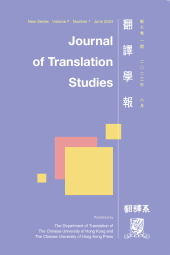 |
|
||||||||||||||||||||||||||||||||||||||||||||||||||||||||||||||||||||||||||||||
| Thomas Francis Wade’s (1818–1895) Translations of Yi 夷 and Sino-British Relations during the Mid-Nineteenth Century |
|---|
| Tengfei Ma The Chinese University of Hong Kong Hong Kong, China |
|
Abstract The translation of the Chinese character yi (夷) as “barbarian” caused a myriad of issues between Britain and China during the eighteenth and nineteenth centuries. When translating Chinese documents in 1861, Thomas Francis Wade (1818–1895) defended the use of the character by Qing officials and explained, “I incline to believe that the word barbarian was here introduced by mistake.” This was a unique occurrence. By comparing Wade’s various translations of yi, this article supplies ample examples of how the correlation between his various applications of yi coincided with the changing state of Sino-British relations. On the surface, his varying points of view appear contradictory. However, upon closer inspection, they are not inconsistent and were applied for the purpose of shaping Sino-British relations, as he adjusted the translation to coincide with the climate of Sino-British diplomatic relations. In addition, while being a diplomatic interpreter, he used the translations of yi as a bargaining chip to further political interests during negotiations. This further reflects the complexity of being a diplomat and interpreter overseeing Sino-British diplomacy. |
| 晚清偽譯政治小說中的行動主義傾向:以《自由結婚》為例 |
|---|
| 齊金鑫 (Jinxin Qi) 中國 中山大學 李德超 (Dechao Li) 中國香港 香港理工大學 |
|
摘 要 作為一本鼓吹暴力革命的小說,《自由結婚》披著翻譯的外衣,猛烈抨擊晚清政府與西方列強,體現出強烈的政治動機。而以翻譯的面目示人,可以使小說一方面吸引目的語讀者,另一方面規避權力機構的審查。對於偽譯者而言,「翻譯」不是目的,而是一種「抵抗」甚至「介入」的手段。偽譯集中體現了行動主義翻譯,是其最激進的表現形式。以翻譯之名行革命之實,偽譯者充分利用目的語文化中的主流意識形態,將偽譯在社會轉型時期所能起到的變革甚至顛覆作用發揮得淋漓盡致。 Abstract As a political novel that advocates violence against the Qing government by then revolutionists, Free Marriage brings severe criticism of the society to the fore. The novel, replete with strong political motivations, is under the guise of translation for two reasons: first, it can attract target readers due to the popularity of the translated works at that time; second, it can evade censorship from the authority. Translation is not an end but a means of “resistance” and even “engagement” for the pseudotranslators. Pseudotranslation is the quintessence and the most radical form of activism translation. By catering to the dominant ideology in society, the pseudotranslator brings the revolutionary or even subversive role of translation during transitional periods into full play. |
| Renarrating The Catcher in the Rye in 1960s China: Regimented Translation, Demonized Literature, and Conflicting Narratives |
|---|
| Xin Zhang The Chinese University of Hong Kong Hong Kong, China |
|
Abstract As Cold War narratives swept across the world of letters in 1960s China, American literature was translated into Chinese for political rather than poetic reasons. One of the most prominent translated pieces was Jerome David Salinger’s novel The Catcher in the Rye (1951). This regimented Chinese version was circulated internally among highclass Chinese officials and scholars. By renarrating this novel into a “degenerate work” of the Beat Generation, Dong Hengxun 董衡巽, along with other spokespersons for Chinese authorities, demonized the United States as an amoral nation, challenged the metanarrative of capitalist modernity, and legitimized its socialist counterpart. However, the translator Shi Xianrong 施咸榮 selectively appropriated clashing voices in his postscript to create a narrative battleground and thus implicitly renarrated The Catcher in the Rye from a degenerate work into a controversial one by highlighting its literary merit. The conflicting renarrations of the novel in question essentially epitomized a motley variety of contrasts: politics vs. poetics, the East vs. the West, domestic identity vs. foreign otherness, and, ultimately, socialist modernity vs. capitalist modernity. By weaving together various historical materials and drawing heavily on Social Narrative Theory, this case study contextualizes the translation, circulation, and criticism of The Catcher in the Rye in 1960s China and positions relevant renarrators within the stories that informed their discursive behaviors, thereby revealing the variable distance between said transcultural mediators and the dominant narratives of politics and poetics at that time. |



